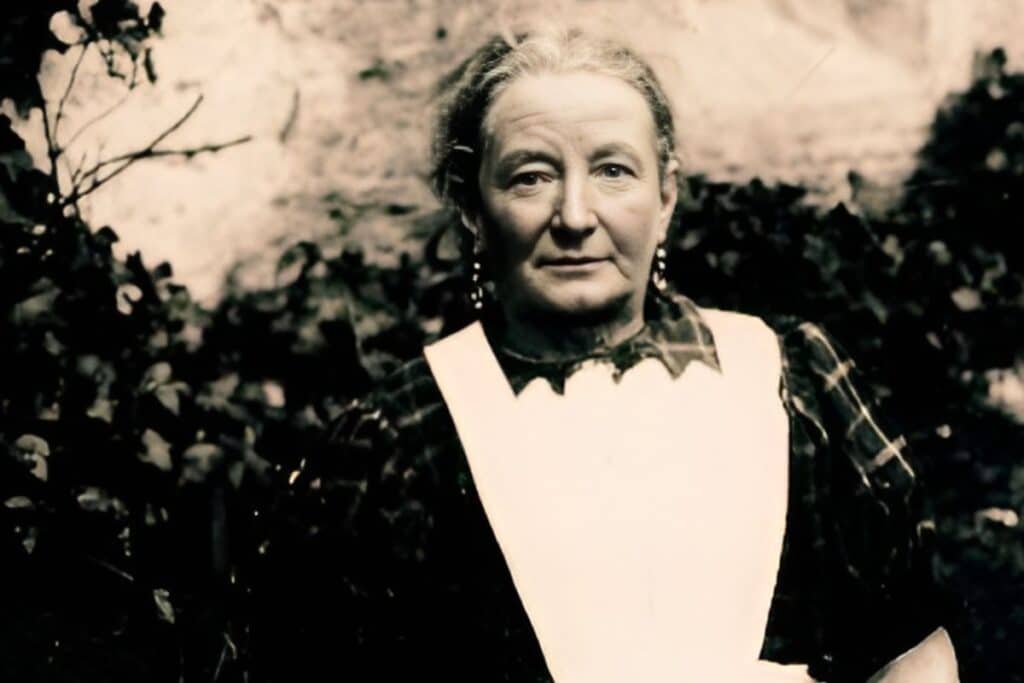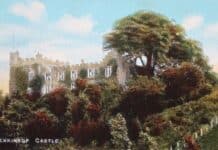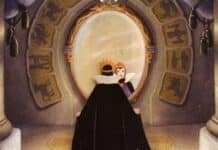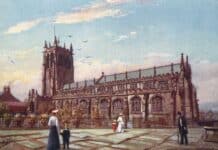Nell Racker was a Victorian midwife accused of witchcraft, whose journey mirrors the trials of Pendle Hill and Salem, leaving behind a legacy of pioneering holistic medicine amidst controversy and resilience, writes GEMMA JOHNSON

In researching my hometown of Rochdale, I have uncovered many fascinating tales of the paranormal, folklore and urban legend. I was scouring through the local studies archive when I uncovered a picture of a weather worn woman wearing a white apron, stood in front of a stone cottage with a well-established garden. Her greying hair pulled back from her face; she looked tired as though the challenges of life had worn her down.
This was Ellen Wallace, known to most as Nell Racker and she was the subject of folklore throughout the town. Labelled by many as a witch, she has quickly become one of my favourite women of Rochdale’s past.
Who was Nell Racker?
Nell was born in 1846, from an early age she wanted to care for people and so in adulthood she trained as a community midwife. Birth would take place within the home; hospital births weren’t the norm during the Victoria era. Nell took great pride in caring for women during their hour of need when they were at their most vulnerable.
She helped bring many babies successfully into the world. But Nell wanted more, she felt that there needed to be more opportunities for treatment that extended beyond the potentially barbaric medical interventions that were common practice for Victorian doctors.
With this at the forefront, Nell trained in herbal and spiritual healing. Nell would collect her materials from the natural environment around her, scaling the moors to find herbs and flowers that would form her ointments and preparations.
Initially, used to help women during labour, Nell expanded her service to offer treatment to the wider community. Word spread quickly about ‘Nell the Wisewoman’ with people travelling far and wide to access her treatments.
But just as much as Nell was regarded for her herbal treatments, she was subject to much controversy from the medical community who felt that she was undermining medical interventions. As she continued to expand and develop her practice, she began to include psychological healing which involved spiritualism.
Nell was providing an early example of holistic healing, focusing on the mind and the body but the element of spiritualism proved a potential step too far. Nell was not afraid of demonstrating her gift of clairvoyancy and began to include her Mother within her practice who was a skills spiritualist offering divination and healing through charms.
Witchcraft accusations
Witchcraft accusations began to echo around the town for surely it wasn’t possible for spiritualism to be practiced without an element of the occult. One of the accusations was that it wasn’t actually Nell Racker that was conducting the healing practice, she had channelled the devil through engagement with the occult and it was Lucifer himself who was healing in exchange for the souls of those who attended Nell’s clinics.
But Nell also looked like a witch – wild hair, small in stature and slightly stooped with potions and ointments being made over the fireplace. Kettles and pans hung from trees within the wild garden at the front of her cottage.
To her patients, Nell Racker was a godsend through her nurturing, person centred care. Always discrete and taking time to listen to their needs. But, within the outside medical communities, and religious groups who had now homed in on the controversy surrounding Nell. Great delight came when there was an opportunity to strike Nell off the midwifery register in 1917 following an accusation of negligence.
Nell’s story feeds into the narrative that surrounded the Pendle Hill witches of 1612 and the Salem witch trials of 1692, accusations made towards women who were breaking from the norms of religion. Women who had a voice and were using it or women who were viewed as different whether in physical appearance or mannerisms.
Rather than accept the differences, it was too easy to throw the ‘witch’ label around causing devastating consequences for the women and those around her. Whilst there was no threat of execution for Nell, she lost what she had worked so hard for – her career as a midwife and nurse.
But Nell can seek solace in that she is still spoken of today, she has shed the label of witch and is now fondly remembered as a pioneer of holistic medicine. Nell Racker died in 1933.
Tell us your thoughts about this article about Nell Racker in the comments section below!








1962?
You’re correct the Salem Witchtrials weren’t in 1962. Thanks for the pick up Daniel, we’ve fixed the typo!
Great article but i think its a bit shortsighted to bond poor Nell with the Pendle Witches. After alot of research into the 2 families centred on the Pendle trial it wasnt a case of wise women helping mothers using natural remedies, thus becoming targets for the rising male dominated medical profession. The Device and Whittle families were long time cunning families in the Pendle area and also had a nice line in spiritual protection rackets. If you crossed them in any way they could make life very hard for you, as shown when John Device refused to pay Anne Whittle a monthly corn load. He died later that year. Coincidence maybe but to the Device family, who had now lost the head male of the household, this was Anne Whittle ( known as “Aul Chattox” to the folk of Pendle) cursing the Device family. The Device family were not as well regarded as The Whittles, they lived on their wits, doing odd jobs, begging and selling charms n potions to the local farms, in direct competion to the Whittles. Accusations of witchcraft had been levelled at the Device Matriach, Elizabeth Southerns ( Aul Demdike) for years but she had always wriggled out of trouble until the events of 1612. Southerns’ grandaughter, Alizen Device tried to beg some pins off a pedlar called John Law, but he refused, brushing passed her. Not uncommon for Alizen so she shouted a curse at him, much in the same way we might swear at someone or yell a profanity during a stressful event. This time, the curse worked and the pedlar collapsed with all the symptoms we would now recognise as a stroke. Alizen was terrified and even went to the pedlars bedside and begged forgivness, but it was too late. The family feud, the past accusations, the whispers n rumours, the local fear of the 2 families all became fuel for the ambitious rise if the local JP, Roger Knowle. He was a rising protestent politician in a newly protesetant country led by a paranoid protestant king, James I. I dont think Knowle saw Gender, just a collection of dangerous non- protestants who he could use to show James I his loyalty. The families’ own beliefs and local bad reputations became their downfall. Central to this was Jennet Device, the youngest of the family. She was also the bastard child. Pucked on and abused her her mother, Grandmother and siblings. She became the star witness and openly and freely accused her mother in court. Asked to pick out members of the local coven in a crowd? She did. This led her own brother to turn on the family aswell! Alizen was beside herself with regret, she knew she had caused harm by her curse and this is the defining point of the Pendle trial. They believed it! It did not matter that the 2 cunning folk families had SOLD, not given Sold, cures to folk. They had also caused harm. Too much harm for people in the community to protect them, they became the perfect choice. Other innocent folk got lumped in with them aswell. Alice Nutter was not a cunning woman, had no knowledge of folkcharms. She did have 2 things going against her though: she was from a powerful Catholic family. Another perfect target. So you see, it wasnt just innocent happy herbal medics being targeted, it was a political war. In fact one of the reasons the witchtrials ended was because of the work of William Harvey, chief medic to James I, who used science to prove that the witch trials were bogus. Indeed i think of William Harvey as one of the fathers of forensic science. Due to his and his teams work he saved alot of people from being excuted on charges of witchcraft. He might have destroyed Witchcraft but he ended up changing James I whole philosophy on witchcraft. So please think on the Pendle trials, the saying goes ” just cos your paranoid, doesnt mean they’re not out to get you” folk today should also think, ” just cos folk are accused of witchcraft doesnt mean they are not out to harm you”. Witches are people, people can hurt you.